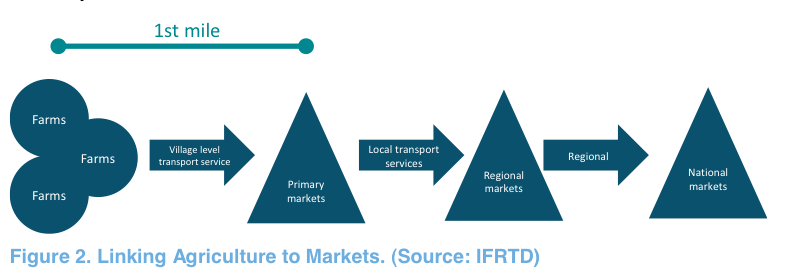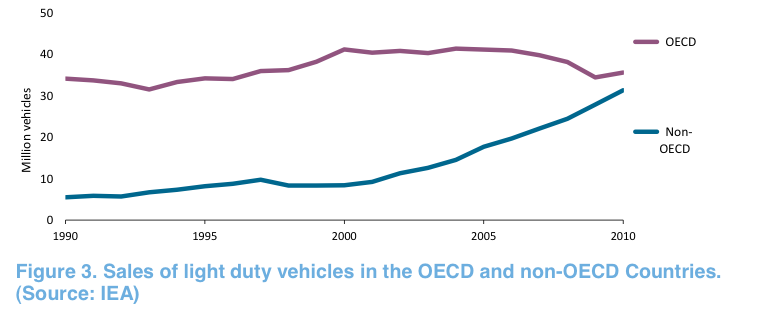SLoCaT (THE PARTNERSHIP ON SUSTAINABLE, LOW CARBON TRANSPORT)
Chapter 1
Sustainable, Low Carbon Transport- Why it Matters, Now and in the Future
“Transportation and mobility are central to sustainable development”- The Future We Want, Rio+20, 2012
The global community is in the process of renewing its commitment to eradicate poverty, ban hunger and help ensure that everyone has a fair chance to be educated, healthy and gainfully employed. On 25 September the United Nations General Assembly meets in New York to review the implementation of the Millennium Development Goals, which come to an end in 2015. Work has started to translate the outcomes of Rio+20 — the United Nations Conference on Sustainable Development, held last year in Rio de Janeiro — into Sustainable Development Goals.
The global community will be led in its deliberations by the recent report of the High Level Panel of Eminent Persons on the Post-2015 Development Agenda which stated: “Our vision and our responsibility are to end extreme poverty in all its forms in the context of sustainable development and to have in place the building blocks of sustained prosperity for all”.
To realize transformative change Sustainable Development needs to be put at the core argued the panel argued. The panel stated its conviction that “countries, local governments, businesses and individuals must transform the way they generate and consume energy, travel and transport goods, use water and grow food”.
Such a sustainable transport transformation will require improving access but to do so in a more sustainable manner than through past and present transport policies. Last month, for the first time in the history of mankind CO2 concentrations passed the threshold of 400 parts per million. Transport, through its continued increasing emissions, was an important contributor to this alarming trend. Transport will need to be a key part of the move towards a low carbon economy and be fully integrated in the new global agreement on climate change, which is being negotiated under the United Nations Framework Convention on Climate Change (UNFCCC). Reducing the climate impact of transport will also greatly reduce air pollution from transport, which is an important contributor to the 3. 2 million premature deaths from ambient air pollution (GBD, 2010). Transforming the transport sector also means reducing the 1.3 million deaths from road crashes, a higher number than those killed by malaria or tuberculosis on an annual basis (WHO, 2013).
No Development without Inclusive Access
The critical importance of access as an enabling factor was highlighted by the High Level Panel which stated that “We should ensure that everyone has what they need to grow and prosper, including access to quality education and skills, healthcare, clean water, electricity, telecommunications and transport”.
Access is important in both urban and rural areas. By providing better access farmers are able to get their crops to the market, people will find it easier to reach jobs, schools, and hospitals. Access rightly identified by the high level panel as a key enabling condition for sustainable prosperity.
Improving access means more than building roads as the example of Nairobi, Kenya and many other African cities demonstrates. Notwithstanding extensive urban road networks more than 50% of the trips in several of Africa’s cities are on foot. It does not come as a surprise that it is especially the poor who lack proper access. This makes transport a key sector in the fight against poverty. Policy makers should therefore emphasize the inclusive nature of transport.
Transport and access are of key importance as well for rural development and ensuring food security. It is especially the first mile or kilometer (see Figure 2), which will make the difference for agricultural producers whether they can engage in the market economy and prosper or whether they are destined to remain part of the subsistence economy.
Poor rural roads are a significant source of post-harvest losses, especially during rainy seasons. Rural road transport in Africa often costs 3 to 5 times more than main road transport (World Bank, 2013). On an agricultural continent, only one in three rural Africans has access to an all-season road. Those facing more than eight hours of travel to an urban center are effectively trapped in subsistence farming.” (Foster, and Briceño-Garmendia, 2010).
Read full report (PDF) here: Creating Universal Access to Safe, Clean and Affordable Transport
About SloCaT
www.slocat.net
“SLoCaT (the Partnership on Sustainable, Low Carbon Transport) improves the knowledge on sustainable low carbon transport, helps develop better policies and catalyze their implementation. Over 50 organizations have joined the Partnership, including UN organizations, multilateral development banks, technical cooperation agencies, NGOs, research organizations and other organizations. SLoCaT is a voluntary multi-stakeholder initiative that contributes to the implementation of Agenda 21, Rio+5 and the Johannesburg Plan of Implementation (JPOI). The Partnership is documented on the UN Partnership website.”
Tags: Affordable Transport, Clean, Low Carbon Transport, SAFE, SLoCaT, Sustainable








 RSS Feed
RSS Feed